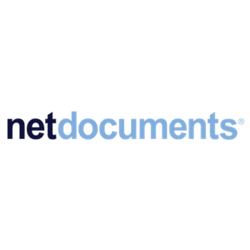The NetDocuments document management platform helps companies boost productivity and eliminate security and compliance worries.
Today’s professional services firms are generating more documents in more formats and housing them in more locations than ever before. But with more files come more problems. Employees struggling to find what they need, when they need it. Companies lacking confidence that their information is secure and that they’re complying with key regulations. And the ongoing challenge of enabling effective collaboration between individuals, teams, and offices.
The NetDocuments platform helps businesses manage, collaborate, and share content in one secure location. Whether we’re talking documents and spreadsheets or presentations and emails, the platform offers a single source of truth for the information that matters most. Ultimately, it improves workplace productivity and ensures sensitive information is never lost or in the wrong hands.
Q&A with the Former CEO

Matt Duncan, NetDocuments
Former CEO
-
What would you advise other businesses in finding the right growth equity partner for them?
Imagine facing the most difficult existential crisis of your business. Then think, out of the people you have met with and talked to, who could you see yourself working through these problems with?
Look for someone who is not only going to be level-headed but who is going to work with you through the process of dealing with the decisions you’ll need to make. -
If you think back to NetDocuments before you partnered with Frontier, what were your ambitions for the business?
We started back in 1999 with a cloud-only solution which meant we were ahead of the market at the time. Actually, we were way too early, but we really believed in the transformative nature of the cloud.
It did mean we needed quite a bit of patience while the market caught up which is difficult when you're growing a company. I think as a result we developed just a little bit of complacency (even though we were still growing and doing well).
Frontier got involved in 2014. At that time my father, who founded NetDocuments, believed the business was ready to move to the next level. He could see that this would mean attracting some growth capital but also getting some people involved that could inject more urgency and discipline into the business. -
What were some of the key criteria you were looking for in an investment partner?
We were really looking first and foremost for a partner we could trust. Someone who wouldn't break the good things about the business.
All successful businesses have some elements that definitely work and are unique. They may not be optimized, but if the business is succeeding, they're doing something right.
We wanted an investor who could both help us continue what had made us successful and also make some changes. We knew that to fulfill our potential we were going to have to break a few things or make some difficult changes. -
Was there a particular inflection point that made you begin looking for a growth equity partner?
My dad wanted to retire. He firmly believed that NetDocuments could really take off but that we couldn't do it alone or just with the people that were in the business at the time. He knew we would need the best practices, the stimulation, and even the impetus that a partner brings—someone who’s transaction-oriented, that wants to come in, grow the business, and then have a liquidation event down the road.
We’d been lucky. We survived two major crashes—the dot com crash and the Great Recession—and the business was healthy because it was a subscription model. But if we really wanted to seize the opportunity and scale up before somebody else came in and did it, we would need help. -
What were the main business challenges that partnering with Frontier helped NetDocuments address?
One thing that really helped right out the gate was working with me on a strategic plan. It’s what they do with all their companies. It helped us get aligned around questions such as: What are we trying to grow to? What are we trying to achieve? What do we want to be? And just as important, what do we not want to be and not want to pursue?
The resulting plan created a very aggressive but also attainable goal (one that we exceeded in a three-year timeframe).
They also helped with a thorough evaluation of people—who was in which position—and then helped us get the right team in place. -
What were the key levers that fueled growth after becoming a portfolio company?
The first thing was an overhaul of our sales organization. We recruited a new leader and some key new hires and doubled down on a channel program. That was probably the biggest impact and another thing we wouldn't have been able to do without Frontier.
We were also able to make an opportunistic acquisition that really complemented our core product, and which contributed about 50 million dollars to our enterprise value. Frontier’s support in the acquisition helped us go from a one-product company to a multi-product business. -
What would you say was the the biggest result of the partnership with Frontier?
The biggest result was being able to capture a massive opportunity that we wouldn't have been able to without them.
They brought a goal-oriented approach and a plan for a big outcome and a big exit that we didn't have. Before, we didn't really have a specific destination in mind. With Frontier, we got aligned around the ambition to become a several hundred-million-dollar business in a short period of time.
It sounds over-simplistic, but without Frontier, we wouldn't have had the outcome we had and there was a real possibility of an existential threat to the business. Because if you don't scale up and cross that chasm, you're going to miss your window and someone else is going to capitalize on it. A sleepy competitor is going to wake up. Or a new entrant will come in. All those things have since happened. -
Did you use Frontier’s Operating Partners? What value did they bring?
Through Frontier, we gained access to a number of key advisors and mentors.
The firm connected me with a very experienced CEO who I could call anytime. Their recruiting expert helped us with critical hires such as our CFO and VP of Sales (the two most important hires we made in our partnership with Frontier). And they brought in a specialist to evaluate our sales operation and go to market strategy, and help us make it more effective. -
What would you say is a key to hiring great people in the business?
You have to understand what you’re trying to achieve.
You want someone who's going to make changes and some of those changes are going to be painful. They're going to hurt. That person may have to break one or two things to fix an entire department. But importantly, it has to be someone also fits the culture.
You need balance. Someone that's neither too radically different from the existing culture nor too much like the team you already have. -
What do you know now that you wish you knew when you were a startup about growing a software business?
For me, it's really that time is of the essence. Impatience is important.
These days things move so fast that you have to seize an opportunity and move even faster—probably faster than you thought when you first started. And to do that, you really need to work with the right capital partners, maybe even sooner than you thought. Because today, it's a case of scale-up fast or die.
We were lucky. Our main competitor was asleep. Had they woken up just a little bit earlier, we would have missed the opportunity. If I were to do it again, I would try to move even faster.
Disclaimer
This endorsement was not provided by a current actual client of Frontier Growth and was solicited by Frontier Growth. Persons providing endorsements were not paid any compensation of any kind directly or indirectly. These endorsements may not be representative of all clients and are not indicative of Frontier Growth’s future performance. They are not based on the evaluations of clients or investors of Frontier Growth.
Frontier Team

Next Company
InteliSecure
Data loss protection and security



